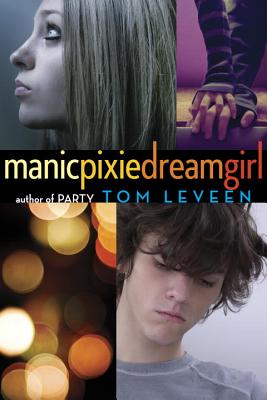Meet the Writer - Tom Leveen
An author interview on the craft of writing.
Featured Writer: Tom Leveen
Book: manicpixiedreamgirl, Contemporary YA
In celebration of Tom's latest book, and because I LOVE MY READERS :D I am giving away a signed copy of manicpixiedreamgirl! Read on, and enter for your chance!!I said it when I read Party, Tom Leveen's debut novel, and I'll say it again: I will be very very shocked if we don't see a TV or movie adaptation of his work sometime in the near future. While Party could easily be adapted into an MTV series (each of eleven chapters is told from a different character's point-of-view, all on the same night - at a high school party), and Zero has an indie-film feel, manicpixiedreamgirl is like today's version of a John Hughes film.Yes. I just compared up-and-coming YA author Tom Leveen to the Martin Scorsese of 80's teen angst.And it's apropos, considering, in Tom's own description of himself freshman year, he had "that whole John Bender thing going," or at least that's the look he was going for at the time. But as all of us former freshmen know, the look you want to have is much further from the persona you actually project. We want to be badass, confident and sexy; when in actuality we are awkward, nerdy, and to most of the world, still "kids."In manicpixiedreamgirl's Tyler—loosely biographical—Tom captures these feelings to a T. Internally, the rush of what you wish was your reality, all the hopes, dreams, and feelings flowing like a fast-moving river; the image of yourself looking fabulous, walking up to your crush and reciting some impressive commentary on Whatever Is Relevant At The Time. But externally, you can barely look them in the eye, and what you really say—the still-puddle of one-syllable responses: "yup," "nope," "uh..." John Bender reduced to Brian Johnson.I first introduced you to Tom in this guest post for Will Write for Coffee. When I met him, Tom had just released his first book, Party, and gave a presentation at our regional SCBWI conference. I had loaned out my copy of Party to a friend, and had stupidly forgotten my wallet in my other purse and wasn't able to buy a copy at the conference. Being a geek, I like to have signed copies from authors I've met. I asked Tom if I could order a signed copy online. He did the absolute coolest thing right then and there—checked to make sure no one was looking, held his finger in a "shh," and slipped me a copy from his messenger bag, which I then sheepishly brought to the autograph table about 10 minutes later. He's been a rock star in my mind since.Even better, after I'd asked him to do this interview, he was scheduled to appear at out local Indie, Changing Hands Bookstore, for the release of manicpixiedreamgirl. I dragged my 15-year-old son and his friend along, and listened to them complain all the way about how boring it would be. I had to bribe them with Jamba Juice just to go with me. (Really, five bucks for a fruit shake?) I forced my son to actually sit down with me during the presentation, rather than let him wander around the store wreaking havoc. What a heinous mother I am.About two seconds into Tom's presentation, my son and his friend were laughing hysterically, and I was laughing so hard I was crying. He is so animated and enthusiastic about what he does, and grateful for his ability to do it, it's infectious. And by the time he's done relating Tyler's story to his own evolution, you are pretty much just as in love with his wife Joy as he is. Seriously, if your school or organization is thinking of an author visit - don't even look anywhere else - Tom will entertain and motivate like none other. And if Tom isn't enough, his son Toby will definitely do the trick.It's an honor and a privilege to introduce you.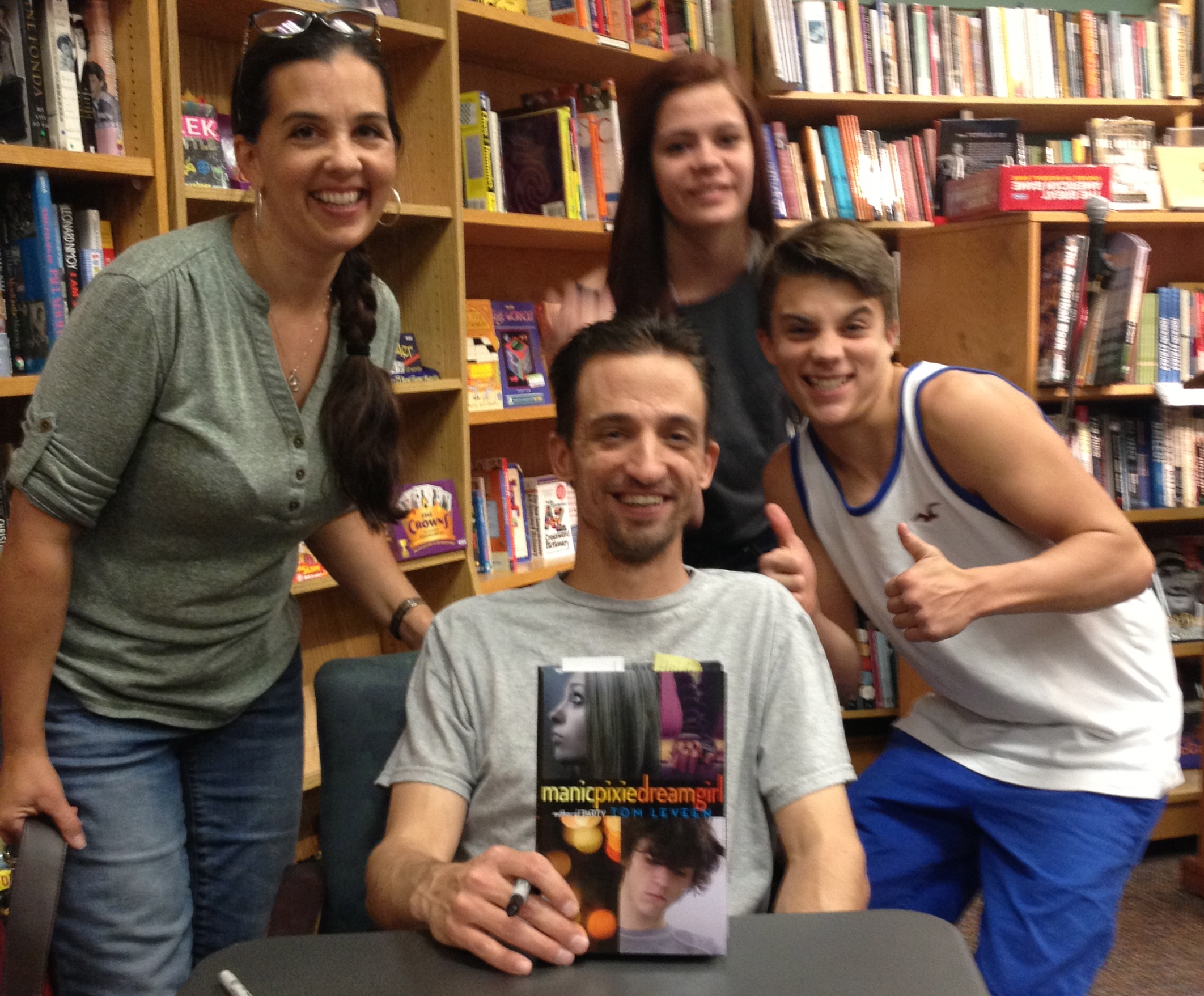
Meet the Writer: Tom Leveen
On craft:
How old were you when you started writing?I wrote my first story in second grade, so, about seven years old I think. My teacher made me rewrite it and read it aloud to the first graders. At first I thought I was being punished for something, but once I got up in front of the class, I knew I wanted to do this for the rest of my life: tell stories and be in front of an audience. So that’s worked out well.Where do you write?I write in an indie coffee shop not far from my house, and also in my home office.
When do you write?New stuff—brand new, no revision-type stuff—I generally do in the mornings. I used to stay up all night and write, and I miss doing that, but having a toddler has that effect. I use afternoons and evenings to do editing or revision, as well as other business stuff. Like answering interview questions!What helps you write—music, pictures, maps, journals, etc.—what gets you into that mindset?A routine.I recommend this to all writers. If you can get into a pattern, your brain starts to make associations. Like at my coffee shop, there’s a certain table and certain chair I always use, and within a few minutes of being there and getting set up, I can feel my brain (usually) start to click over to the job at hand, which is continuing that day’s story.Beyond that, internet research helps me a lot. The more I dig into a topic and click around on websites, the more ideas I get. I do usually make playlists for my stories, too, but I don’t listen to music while I write anymore. Sometimes when I’m making copyedits, but that’s it.What are some things that stand in your way? logistically as well as creatively?See above!No, really, the internet is without doubt the writer’s best friend, apart from time. But it’s also a curse, because man, you start off with just needing to know some quick obscure fact, like the capital of Guam, and then an hour’s gone by and you haven’t written a word. And by “you” I mean “me,” of course.Creatively what makes me stumble is doubt coupled with certainty. For whatever reason, the stuff that I feel most excited about turns out to be my worst writing, and the stuff I’m sure sucks is inevitably what my agent picks up on and wants to read more of. So it gets very confusing in my head sometimes.What do you do when you "hit a wall?"It depends. I’ve gotten better at being honest with myself and how I’m feeling, be it physical or mental. There are some days like, “You know what? This ain’t gettin’ done. It’s just not happening.” When I feel like that, then I pack it in and do something else for the rest of the day, and try again tomorrow. Then there are other times I hit a wall, but I can still feel like the words are there, the story is there; I just have to figure it out. In those cases, a walk helps. Pacing around the house. Talking out loud. Anything to let my mind wander for a bit. Usually within ten to thirty minutes the dam breaks.Beyond that, I will often just open a new story and start something new or work on something old. Let my subconscious figure it out. Do you use an outline—do you know exactly how the arc will play out—or do you just let the story develop as you write? If so, how do you outline? (notecards, etc.)Hm…good question. I guess both.What tends to happen, lately, is I free write a first draft, or at least half a first draft, and then go back and give it an outline. Sometimes I’ll use the Hero’s Journey as a template, not necessarily point by point, but just to see if there is in fact, you know—a plot. (There isn’t always, especially in that first draft.) My outlines usually just consist of a Word doc with notes (often longer than the book itself, it turns out), and sometimes an Excel doc so I can move things around and keep the plot points, character names and locations, etc., organized.In terms of the arc, I don’t usually know exactly how things will turn out, though on some stories, I discover the ending about halfway through the writing. Zero’s ending has been the same since the first draft in 1993. For manicpixiedreamgirl, I knew most of where I wanted it to end up. But with Party – which went through more drafts than the other two – I never did know for sure how to tie it up until just before we pitched it.How do you draft/revise? (i.e. do you just get it out in one big "dump," then revise, revise revise, or do you revise and edit as you go)I try hard to get the first draft out all in one go. Usually what happens is I’ll do a bit of revision as go, though. If I stop to revise too much, the book never gets done. And there’s no point in revising a story that had no middle or end. I think I’ve gotten better about completing those first drafts. They are awful, but that’s what first drafts are for!What are some tools that you use? (reference guides, manuals, websites—a favorite pen/notebook/computer)Well, I use the internet pretty extensively for research, whether it’s just a quick fact check or more in-depth. I often use videos, too—documentaries, usually, or travelogues. I do all of my composing on my desktop and an obsolete netbook. Come to think of it, the desktop is obsolete too, but I can’t stomach the newer versions of Word. I want my old 2003 version, thanks.Lately I’ve also appreciated using a handheld recorder or the sound recording option on my cell phone to speak quick notes or lines of dialogue before I forget them. That’s been hugely helpful.Beyond that, I don’t really have anything special to use while writing. I don’t think…Do you use critique groups? How did you find them?I do not, at the moment, but I did before I was published. I highly recommend the forums at www.absolutewrite.com, without whom I would never have gotten my first agent. No question.I haven’t really had a formal critique group since college. I think there is value in them, but I also thing aspiring writers need to know what to look for—namely, people (or just one or two good beta readers) who will not only be honest, but know what to be honest about.I’ve taken some creative writing classes that I really enjoyed attending, for instance, but in hindsight realized: I didn’t learn a damn thing! The feedback was nice and encouraging, and I made a few changes that helped the story…but a bunch of people saying “I liked this; I didn’t like this” is not the same as a knowledgeable person saying, “Your pacing is too slow in chapter two. Your secondary characters are flat and uninteresting. The plot is too convoluted. Cut chapter four entirely.” Things like that. Concrete ideas and suggestions that turn a decent book into a marketable book.I don’t know how to find those. But if anyone in the group has published, that helps. But the real hard part is listening to criticism and knowing when the criticism is right. I always recommend checking local libraries and indie bookstores for groups.
Do you use an outline—do you know exactly how the arc will play out—or do you just let the story develop as you write? If so, how do you outline? (notecards, etc.)Hm…good question. I guess both.What tends to happen, lately, is I free write a first draft, or at least half a first draft, and then go back and give it an outline. Sometimes I’ll use the Hero’s Journey as a template, not necessarily point by point, but just to see if there is in fact, you know—a plot. (There isn’t always, especially in that first draft.) My outlines usually just consist of a Word doc with notes (often longer than the book itself, it turns out), and sometimes an Excel doc so I can move things around and keep the plot points, character names and locations, etc., organized.In terms of the arc, I don’t usually know exactly how things will turn out, though on some stories, I discover the ending about halfway through the writing. Zero’s ending has been the same since the first draft in 1993. For manicpixiedreamgirl, I knew most of where I wanted it to end up. But with Party – which went through more drafts than the other two – I never did know for sure how to tie it up until just before we pitched it.How do you draft/revise? (i.e. do you just get it out in one big "dump," then revise, revise revise, or do you revise and edit as you go)I try hard to get the first draft out all in one go. Usually what happens is I’ll do a bit of revision as go, though. If I stop to revise too much, the book never gets done. And there’s no point in revising a story that had no middle or end. I think I’ve gotten better about completing those first drafts. They are awful, but that’s what first drafts are for!What are some tools that you use? (reference guides, manuals, websites—a favorite pen/notebook/computer)Well, I use the internet pretty extensively for research, whether it’s just a quick fact check or more in-depth. I often use videos, too—documentaries, usually, or travelogues. I do all of my composing on my desktop and an obsolete netbook. Come to think of it, the desktop is obsolete too, but I can’t stomach the newer versions of Word. I want my old 2003 version, thanks.Lately I’ve also appreciated using a handheld recorder or the sound recording option on my cell phone to speak quick notes or lines of dialogue before I forget them. That’s been hugely helpful.Beyond that, I don’t really have anything special to use while writing. I don’t think…Do you use critique groups? How did you find them?I do not, at the moment, but I did before I was published. I highly recommend the forums at www.absolutewrite.com, without whom I would never have gotten my first agent. No question.I haven’t really had a formal critique group since college. I think there is value in them, but I also thing aspiring writers need to know what to look for—namely, people (or just one or two good beta readers) who will not only be honest, but know what to be honest about.I’ve taken some creative writing classes that I really enjoyed attending, for instance, but in hindsight realized: I didn’t learn a damn thing! The feedback was nice and encouraging, and I made a few changes that helped the story…but a bunch of people saying “I liked this; I didn’t like this” is not the same as a knowledgeable person saying, “Your pacing is too slow in chapter two. Your secondary characters are flat and uninteresting. The plot is too convoluted. Cut chapter four entirely.” Things like that. Concrete ideas and suggestions that turn a decent book into a marketable book.I don’t know how to find those. But if anyone in the group has published, that helps. But the real hard part is listening to criticism and knowing when the criticism is right. I always recommend checking local libraries and indie bookstores for groups.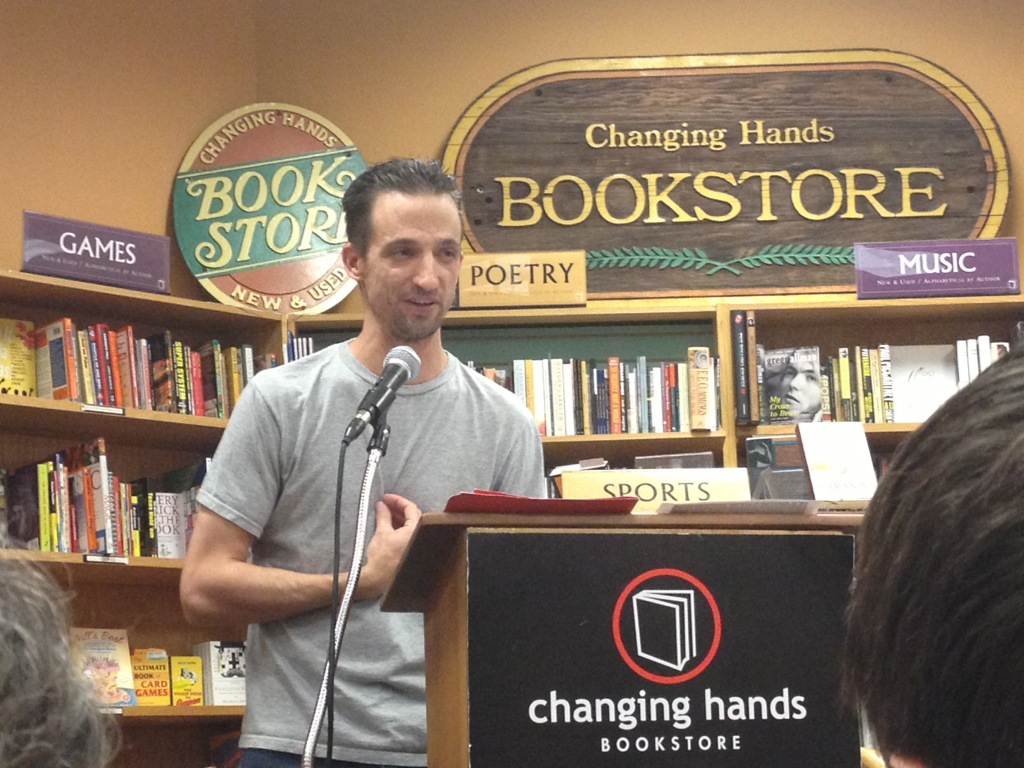
On your current project:
What was your inspiration for this book?Real life! Sort of.I actually already had an outline of manicpixiedreamgirl that formed the spine of a one-man play I wrote and directed a few years out of high school, which itself was loosely based on real events. But manicpixiedreamgirl is not autobiographical; it’s just emotionally true to what I experienced.What kind of research did you do for this book? And, were you surprised by something that you learned in your research?I didn’t need to do much research with manicpixiedreamgirl, because it dealt with writing and theatre, two things I know a lot about. And since the story already had a framework from the play, there wasn’t much to look into.On the other hand, for Sick (Oct. 1, 2013, Abrams/Amulet), I had to do a ton of medical research. Gross, disgusting medical research. I was surprised that my initial concept for the “zombies” in the novel (they are not undead, though the characters have a whole debate about that) was reasonably medically based, or at least could be.How good did it feel to write that last line?For manicpixiedreamgirl? Very good. Like closure. Much like Zero, this one had been with me a long time, and it was nice to put it to bed.
On the business of publishing:
How did you find your agent/editor?I used AgentQuery.com and resources on AbsoluteWrite. I may have even used a print version of Writer’s Market, come to think of it. I built an Excel sheet with the agency’s name, agent’s name, when I submitted, and what if any response I got. I got picked up after about forty rejections by Andrea Brown Literary Agency, and I’ve been there ever since. How has self-publishing shaped your career as a writer? / What is your opinion of self-publishing?I haven’t yet done it, so I can’t speak with any authority. I will underline the “yet,” though, as I am already in the early stages of planning some self-published work.My opinion of self-pub is this: One, it’s not going away. Two, to paraphrase Jeff Goldblum in Jurassic Park: “Writers can get so preoccupied with whether or not they could that they didn’t stop to think if they should.”I’m less of a doomsayer about traditional publishing and agents than some of my best writer friends, but there’s no doubt the industry has changed and will continue to change. But I will also say that my most valuable instruction came from my agents and editors. I always recommend that writers give the traditional route a try first, if only for the experience of revision (and revision and revision and revision…) that goes into a good, marketable novel. Being able to write a good query and condense that novel into 200 words or less is a good skill to have for someone going the indie route.I try to say this to every writing class I teach: Writing fiction is a business. And self-publishing is twice or more the work traditional publishing is because you’re doing it all alone. Yes, there are examples of big breakthroughs, but they are in the minority.My friend Erin Jade Lange (author of Butter) recently said at a conference, “You have to love writing more than showers.” She’s dead right. You have to love this more than just about anything else on earth to make a real go of it. The man-hours it takes to really, truly put out a great novel is daunting. Or should be, if you’re think about it enough. Finishing up your NaNoWriMo book and plugging it into Smashwords on December 1 is not how to do it.Sound advice to all the NaNos out there! What can you share with our readers about marketing? (i.e. what, if any, support did you have from your publisher? Costs involved? Things that worked best/weren't worth it, etc.)Ya know, this is my major weakness. I’m still learning. I think postcards are a great idea, I carry those around with me. Business cards are still useful. Having an online presence is essential, even if you don’t want one.Really the biggest thing was making ARCs and e-galleys available to the book bloggers out there. That’s where a lot of interest gets generated.But when it comes to MG and YA authors, there’s no beating getting yourself in front of students. You don’t need a gimmick or anything; just be yourself and talk about things that matter to you in a way that will matter to them. I think I sell about as many books based on my writing classes and presentations as I do what any journal has to say about the novel itself.(As I stated above, I can attest to Tom's presentation skills. Not only have I seen him talk about his books, but I've taken his "Say Words" writer's workshop. He helps writers portray realistic teen dialogue. And, the class that Tom had been working with at Estella Mountain HS came all the way across town just to celebrate his book release. Think he speaks to kids? Yeah.)
About You:
What is a trick that you've learned along the way that has made the writing process easier?None that I am aware of…Okay, no, just kidding. For me, (relative) silence and having a schedule. Those two things have helped more than anything else. Some authors call it “B.I.C.” which means, Butt In Chair. It means there’s no substitute for sitting down and writing. Now, I myself often stand while at my coffee shop, because they have these great, tall bar tables. But you get the drift. Even if the only time you can write is Thursday morning from five a.m. to seven a.m., then by cracky, that’s when you will write. And the more you do that, the easier it gets.What writers inspire you?The late John Bellairs (The Mummy, The Will, and The Crypt) influenced me a lot. So did early Stephen King stories and novels, and most of Robert Cormier’s books (The Chocolate War, etc.) I kind of want to be Laurie Halse Anderson when I grow up . . . or at least have the range of influence she does. I’d put A.S. King in there, too. These women are at the forefront of tangibly changing the lives of adolescents, and that’s what I want more than anything.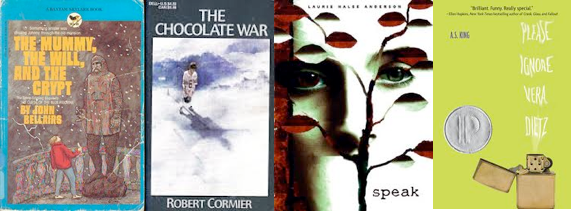 Really the writers who inspire me are the writers who I’ve become friends with since this whole thing started. There’s a whole clutch of YA and MG writers here in the Phoenix and wider Arizona area, and they are truly awesome people. I learn – present tense – a lot from them.What do you like to read for enjoyment?Lately I have been reading a lot of nonfiction. It started when a good friend of mine recommended the popular book Born To Run. I really enjoyed that. Then she recommended another that I fell in love with Animal Vegetable Miracle by Barbara Kingsolver. A third followed. So now anything she recommends to me, I will read.Then I began reading up on Gandhi while doing research, and that led to a whole list of must-reads. So these days, if I’m not re-reading some middle-grade novel from the eighties that I grew up with (kind of like comfort food, only, in words), I’m reading one or more nonfiction books on any number of topics.We all know that learning from our mistakes is part of the process of becoming who we are. As a writer, what's one lesson you've learned that you would like to pass on to others?Writing fiction is a business. Sorry to go all serious on you, but yeah – the instant you decide you want someone to pay you for writing fiction, you are a small business owner. Act like it.I'm so glad you said that. I think more writers need to realize that being an author is WAY MORE than writing a book.What's next for you?Next is Sick (Abrams/Amulet), which releases October 1, 2013. After that is Random (Simon Pulse) in Summer 2014. I’m getting some side projects worked up, slowly. Mostly I just keep looking for places to present and to teach. It’s the best part of all this.I can imagine. After seeing you speak several times, it shows that you really enjoy teaching others about writing, especially kids. Thank you so much, Tom! I hope everyone has learned more about what it takes to be a writer. Readers, see below for more of Tom's books, and a chance to win a signed hardcover copy of manicpixiedreamgirl!Tom's Books:
Really the writers who inspire me are the writers who I’ve become friends with since this whole thing started. There’s a whole clutch of YA and MG writers here in the Phoenix and wider Arizona area, and they are truly awesome people. I learn – present tense – a lot from them.What do you like to read for enjoyment?Lately I have been reading a lot of nonfiction. It started when a good friend of mine recommended the popular book Born To Run. I really enjoyed that. Then she recommended another that I fell in love with Animal Vegetable Miracle by Barbara Kingsolver. A third followed. So now anything she recommends to me, I will read.Then I began reading up on Gandhi while doing research, and that led to a whole list of must-reads. So these days, if I’m not re-reading some middle-grade novel from the eighties that I grew up with (kind of like comfort food, only, in words), I’m reading one or more nonfiction books on any number of topics.We all know that learning from our mistakes is part of the process of becoming who we are. As a writer, what's one lesson you've learned that you would like to pass on to others?Writing fiction is a business. Sorry to go all serious on you, but yeah – the instant you decide you want someone to pay you for writing fiction, you are a small business owner. Act like it.I'm so glad you said that. I think more writers need to realize that being an author is WAY MORE than writing a book.What's next for you?Next is Sick (Abrams/Amulet), which releases October 1, 2013. After that is Random (Simon Pulse) in Summer 2014. I’m getting some side projects worked up, slowly. Mostly I just keep looking for places to present and to teach. It’s the best part of all this.I can imagine. After seeing you speak several times, it shows that you really enjoy teaching others about writing, especially kids. Thank you so much, Tom! I hope everyone has learned more about what it takes to be a writer. Readers, see below for more of Tom's books, and a chance to win a signed hardcover copy of manicpixiedreamgirl!Tom's Books:
Party
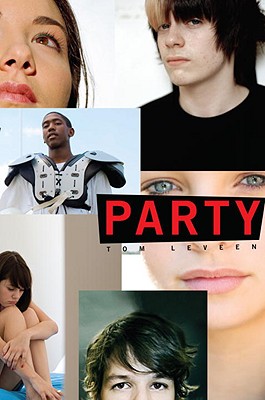
Zero
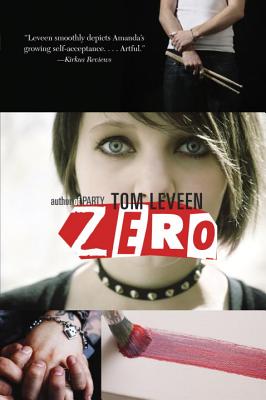
manicpixiedreamgirl
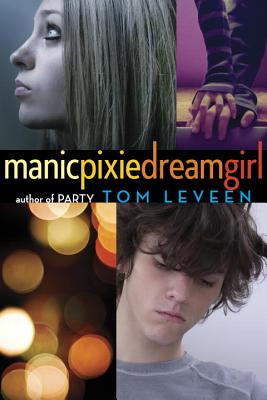 For a chance to win a signed hardcover copy of Tom's newest book, manicpixiedreamgirl, leave a comment about the interview, below! Winner will be chosen at random in one week and notified by email!! Good Luck!Tom's website: www.tomleveen.comTwitter: @tomleveenFacebook: Tom LeveenAnother great interview with Tom: Assembly on Literature for Adolescents of the NCTESee Tom at Phoenix ComiCon! Phoenix New Times review of MPDGLast but not least...What's the funniest thing you've seen online lately? The funniest thing was actually something I had to go back and look up not long ago: A piece from The Daily Show about the Navy SEALs who took out the pirates while on a boat.
For a chance to win a signed hardcover copy of Tom's newest book, manicpixiedreamgirl, leave a comment about the interview, below! Winner will be chosen at random in one week and notified by email!! Good Luck!Tom's website: www.tomleveen.comTwitter: @tomleveenFacebook: Tom LeveenAnother great interview with Tom: Assembly on Literature for Adolescents of the NCTESee Tom at Phoenix ComiCon! Phoenix New Times review of MPDGLast but not least...What's the funniest thing you've seen online lately? The funniest thing was actually something I had to go back and look up not long ago: A piece from The Daily Show about the Navy SEALs who took out the pirates while on a boat.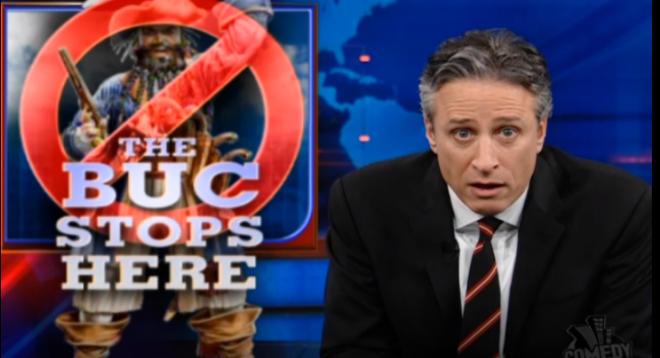 photo of Tom Leveen used by permission © John Groseclose www.photographybanned.comThanks for reading!Heidi
photo of Tom Leveen used by permission © John Groseclose www.photographybanned.comThanks for reading!Heidi
